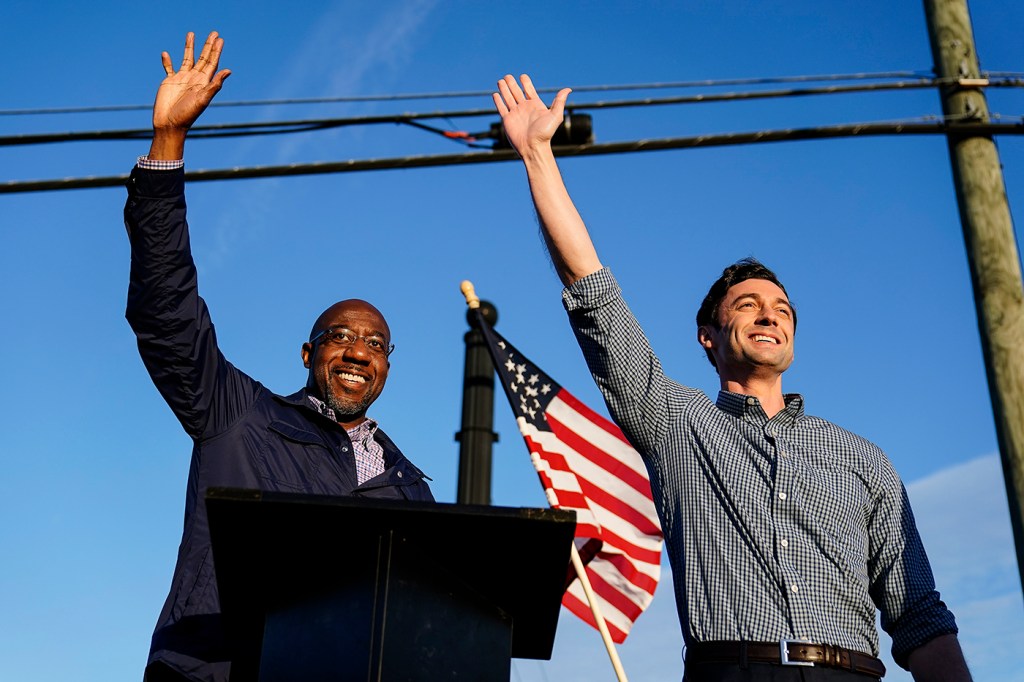Second win in Georgia gives Democrats control of Senate for first time in 6 years

President-elect Joe Biden will likely have an easier time ushering through $2,000 pandemic checks, a public healthcare option, and other legislative must-haves now that both Georgia Senate contests are settled in the Democrats’ favor, Northeastern professors say. But he still faces headwinds from Republicans and even from within his own party that could temper his ambitions, they add.
The margins of victory for both Democrats was large enough to avoid a days-long recount that would have slowed certification and with it Biden’s ability to get his personnel installed quickly. Many of his picks require congressional approval.
Biden, who ran as a moderate, will probably try to initially pass legislation on COVID-19 relief and infrastructure, which have bipartisan support, predicts Dan Urman, who teaches constitutional law, law and public policy, and the modern U.S. Supreme Court at Northeastern.

Left to right: Nick Beauchamp, assistant professor of political science, and Daniel Urman, director of hybrid and online programs in the School of Law, and director of the Law and Public Policy minor. Photos by Matthew Modoono/Northeastern University
For climate change, it’s hard to see what Biden and fellow Democrats can do legislatively with their slim majority, Urman says, since the Senate’s filibuster rule requires 60 votes to pass legislation. “They can’t just pass whatever they want as long as the filibuster remains in place,” Urman says.
It is more likely that Biden will use executive actions related to the climate, immigration, and criminal justice reform, Urman says.
Biden’s path was made easier after Jon Ossoff’s race against the GOP’s David Perdue was called by news outlets Wednesday afternoon, with Ossoff’s lead expanding as more ballots were counted. The 33-year old documentary filmmaker will become the youngest member of the Senate in a chamber where the average age is almost 60.
Ossoff, who nearly won a House of Representatives race a few years ago, “showed that when you have an opportunity to run for office you should take it,” says Urman. “He improved each time he ran, and gained name recognition in the process.”
It will be his first publicly elected position, as it will for Democratic Senator-elect Raphael Warnock, who defeated Republican Kelly Loeffler in a special election on Tuesday. Like President Donald Trump, she hasn’t conceded her race.
The unexpected twin wins in a once reliably Republican state shows how previous Republican strongholds are changing, says Urman, pointing to Arizona as another example. The state has two Democratic senators for the first time in nearly 70 years. Biden also won the state, becoming the first Democratic presidential nominee to do so since Bill Clinton in 1996.
With the Senate now knotted in a 50-50 deadlock, Vice President-elect Kamala Harris will serve as the 51st tie-breaking vote.
The former California senator will follow a vice president who has made record use of his ability to break ties in the Senate. Current Vice President Mike Pence has cast 13 tie-breakers, more than any No. 2 in the modern era of the upper chamber, according to the Senate.
That legislative advantage could spur Biden to hike the $7.25 an hour federal minimum wage right out of the gate as well as pursue electoral changes to expand voting rights and beef up ethics rules, says Nick Beauchamp, assistant professor of political science at Northeastern.
Longer-term, Biden may seek to reform the Affordable Care Act by creating a Medicare-like program that would serve as a public option, as well as create subsidies for free public college and pre-Kindergarten, Beauchamp adds.
“Together these amount to trillions of dollars of spending,” he points out.
Biden’s nominations for the cabinet and other political personnel appointments are much more likely to win swift confirmation, predicts Beauchamp. While Republicans could prolong debate, as Senate Democrats did to some of Trump’s picks, they wouldn’t be able to deep six a nominee without pulling at least one Democrat across the aisle.
The new political reality is already paying dividends for Biden. He tapped federal judge Merrick Garland for attorney general, one of the last remaining key vacancies in the cabinet. The Republican-led Senate blocked Garland from the Supreme Court without so much as a hearing. A Democratic-led chamber will likely confirm him easily as top prosecutor, and it gives Biden the power to name Garland’s successor.
Biden’s calls for unity will likely fall on deaf ears among minority party Republicans. They will probably use the same stalling strategies they did against President Barack Obama, predicts Beauchamp—“block everything and try to win it back in 2022,” he says.
“If history is any guide, [Republicans] are odds-on favorites to win at least the House” in the final two years of Biden’s first term, Beauchamp says.
For media inquiries, please contact media@northeastern.edu.





